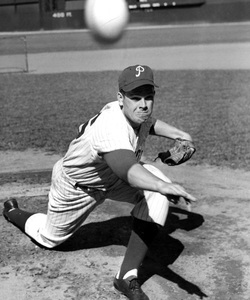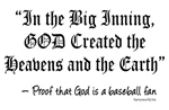
The Phillies had gone through a rough stretch until Roberts came up. They had not won a NL Pennant since 1915, when they lost the World Series to the Boston Red Sox. The Phillies were the second team in their own town, as the Philadelphia Athletics had won five World Series to that point. Roberts emerged, at age 23, to go 20-11, 3.02, 21 CG and a NL leading 5 shutouts to help win the Phillies the pennant in 1950. With young budding stars like OFs Del Ennis and Richie Ashburn, fellow starting pitcher Curt Simmons, and the veteran reliever Jim Konstanty, the Phillies looked like they had finally turned the corner to regain some relevance. Unfortunately, the Phillies could not keep the momentum going, as they had a losing 1951 season. In spite of winning seasons in 1952 and 1953, the Phillies struggled for the better part of the 1950s and were even worse until the NL added expansion teams in 1962.
1950 started a streak of six consecutive 20+ win seasons for Roberts. It is hard to imagine Roberts not winning the NL Cy Young Award for all six seasons if it was possible. A comparible award in all of baseball, the Sporting News Pitcher of the Year, was given to Roberts in 1951 and 1955. After his breakout 1950 season, Roberts went 21-15, 3.03 in 1951, 28-7, 2.59 in 1952, 23-16, 2.75 in 1953, 23-15, 2.97 in 1954 and 23-14, 3.28 in 1955. He led the NL in innings pitched all five seasons, complete games every year from 1952-1956, strikeouts in 1953 and 1954, WHIP in 1954, BB/ 9 IP and BB/K from 1952-1954, 1956 as well as wins from 1952-1955. As he started giving up more HRs from 1955 on, it was hard for Roberts to dominate at the level he was before, especially pitching for a Phillies team that did not seem to be getting any better. After his 1-10 season in 1961, nobody would have blamed him if he gave up pitching after that season.
I make the case, though, that Roberts was a Hall of Fame pitcher by the time the Phillies sold him to the New York Yankees, a team he never pitched a game for, late in the 1961 season. A great comparison is the career of Catfish Hunter. Roberts of course, pitched until he was 39 after playing for Baltimore, Houston and the Chicago Cubs. Hunter was done pitching by the time he was 33. He made the Hall of Fame based on his dominating seasons from 1971-1975, where he won over 20 games each year. A late bloomer, Hunter did not get into a grove until his 6th season, when he went 18-14 for the Athletics in 1970. Hunter finished with a career record of 224-166, 3.26, 181 CGs and 42 shutouts. Roberts, after he was done pitching in Philadelphia, was 234-199, 3.46, with 272 CGs and 35 shutouts. In 1961, he turned 34.
Roberts still wanted to make a run at 300 wins, making a comeback in 1967 for the Reading Phillies. He actually pitched as well as he had in years, going 5-3, 2.48 in 11 starts before he developed arm trouble and retired. Ironically, he made the same amount of starts in 1967 that he had before he made the majors, as he pitched in 11 games in 1948 for the Wilmington Blue Socks of the B League.

 RSS Feed
RSS Feed
